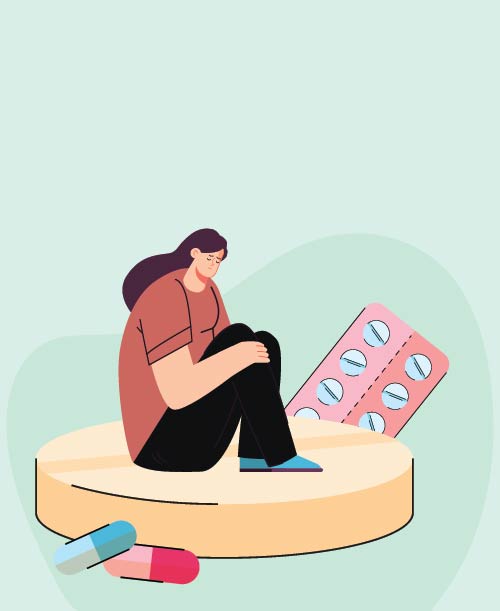

Link Between Substance Use Disorder And PTSD
Post-Traumatic stress disorder (PTSD) is a serious disorder caused by traumatic experience in the past. People who have PTSD and a history of trauma are more likely to develop a substance use disorder. Read on to find out more about PTSD and how substance use disorder comes into play for people who suffer from the disorder.
What is PTSD?
Post-Traumatic Stress Disorder (PTSD ) is a psychiatric disorder that stems from either experiencing or witnessing a shocking and distressing event. Examples of traumatic events include natural disasters, serious accidents, and being in a war, especially active combat.
PTSD can affect people from any background who have gone through a traumatic experience. You can even be suffering from PTSD from an indirect exposure to a disturbing event. PTSD can occur at any age and may disrupt your daily life if not diagnosed and treated early.
Doctors have found that various mental health issues such as depression and anxiety play a role in triggering such a disorder.
What Are the Symptoms Of PTSD?
1. Flashbacks or nightmares
2. Easily triggered by similar situations
3. Experiencing hopelessness
4. Trouble working or sleeping
5. Struggling to interact with people
6. A sudden feeling of fear, anger, or numbness
7. Strained personal relationships
8. Thoughts of self-harm
How is PTSD linked to Substance Use Disorder?
PTSD and Substance Use Disorder go hand in hand for many people. This is because substances appear to grant temporary relief from symptoms.
PTSD often results in self-destructive behaviour as a direct symptom. The immediate result of PTSD is disrupting the chemical balance of your brain. It can reduce the release of certain hormones that affect sleep and happiness, leading to depression, anxiety, and a constant feeling of tiredness. Hence, a patient turns to unhealthy coping mechanisms like drugs or alcohol as these substances help restore hormone levels temporarily.
The risk of people with PTSD abusing substances is 3 times higher than it is in the general population. People with PTSD may feel as though they can control or cover up their thoughts, feelings, or actions only when they are under the influence of certain substances.
How to Treat PTSD and Substance Use Disorder?
There are several treatment options available for someone who has both PTSD and substance use disorder. However, treating someone with both PTSD and substance use disorder is a complicated process and is also less favourable when compared to treating a person with just one of the two conditions.
- Cognitive Behavioral Therapy (CBT), which is a type of therapy that focuses on problematic thought processes and behaviors, is one of the most effective treatments for PTSD and substance use disorder.
Prolonged Exposure Therapy is a specific type of CBT that has been shown to be effective for both disorders.
- For people with substance use disorder and PTSD, practicing mindfulness will help them become less reactive or overwhelmed by feelings of fear that may lead to substance use.
- Medications may be given for symptoms of PTSD, and, in addition, medication-assisted treatments for substance use disorders may also be prescribed.
- Seeking Safety Program is a nonexposure-based therapy that helps patients with co-occurring substance abuse and PTSD.
- With a supervised detox program, it can give people an opportunity to detox in a safe and comfortable environment.
Conclusion
PTSD and substance use disorder are often co-occurring conditions. While self-medicating can be an easy to way to escape the negative thoughts or sensations for a short time but only your healthcare provider can determine the best course of treatment for you that will provide longer-lasting results.
Sources: Very Well Health, Mayo Clinic, Psychiatry, Addiction Center, American Addiction Centers
Disclaimer: This blog provides general information and discussions about health and related subjects. The information and other content provided in this blog, website or in any linked materials are not intended and should not be considered, or used as a substitute for, medical advice, diagnosis or treatment. Kindly contact your Doctor before starting a new medicine or health regime.
Related Articles
Stress Affecting Your Life? Here Are 5 Simple Remedies To Manage Stress
Mental Stress Can Affect Your Body – Find Out How
Practice Mindfulness Techniques To Get Rid Of Stress
Effective Ways To Keep Stress Under Control
Published on October 13, 2022

















 Car Insurance
Car Insurance  Bike/Two Wheeler Insurance
Bike/Two Wheeler Insurance  Health Insurance
Health Insurance  Pet Insurance
Pet Insurance  Travel Insurance
Travel Insurance  Home Insurance
Home Insurance  Cyber Insurance
Cyber Insurance  Third Party Vehicle Ins.
Third Party Vehicle Ins.  Tractor Insurance
Tractor Insurance  Goods Carrying Vehicle Ins.
Goods Carrying Vehicle Ins.  Passenger Carrying Vehicle Ins.
Passenger Carrying Vehicle Ins.  Compulsory Personal Accident Insurance
Compulsory Personal Accident Insurance  Travel Insurance
Travel Insurance  Rural
Rural  Critical illness Insurance
Critical illness Insurance